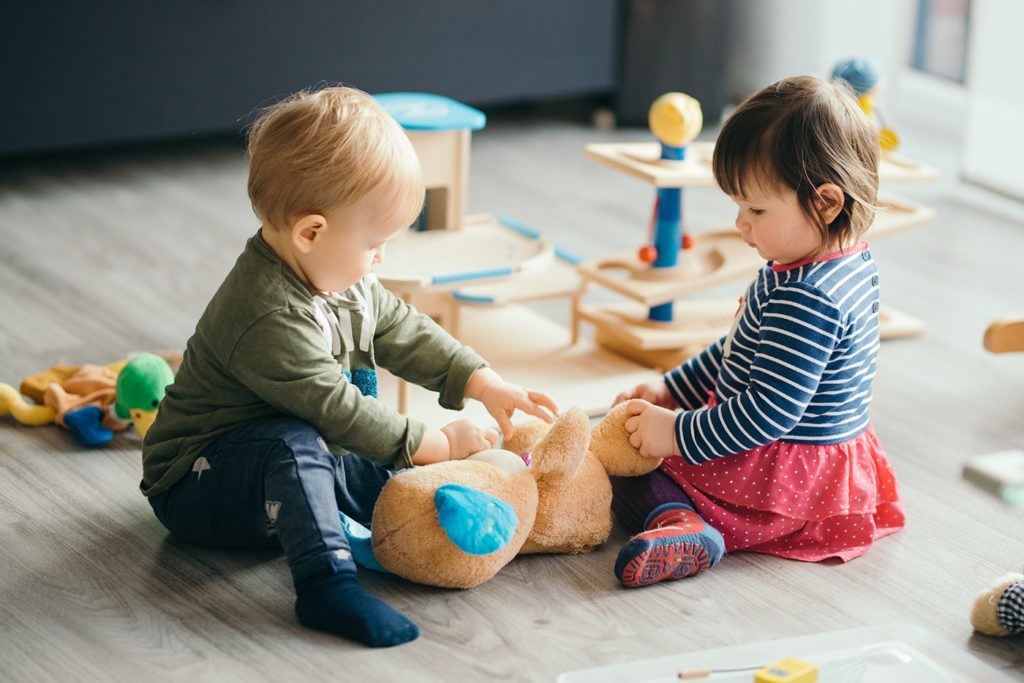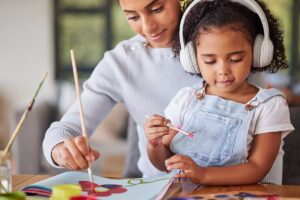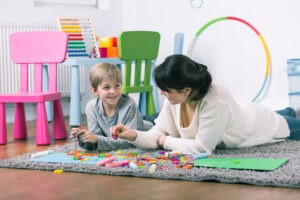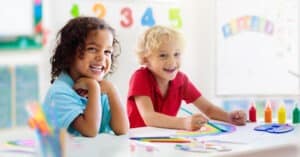“He had it first”, “Take turns”, “Share your toys!” You’re having coffee with another mom at a playdate as you alternate peeking into the next room to respond to crying and remind your little ones of the appropriate ways to interact. While coaching your children through these natural learning experiences is helpful, you can also enhance your child’s social-emotional development through everyday play at home!
Social and emotional development involves a set of skills that children typically start to learn from the earliest moments in their life, like when your baby hears your voice and turns to look at you. Social interaction, self-regulation, and emotional awareness are all part of social and emotional development. Gaining these skills helps your child experience the world, form friendships, and manage their emotions through life.
More reasons it’s helpful to boost this area of your child’s development? Research shows that a child’s social emotional competence in Kindergarten can significantly predict later academic and job success, as well as mental health.
Now let’s get into how you can enhance these very important skills!
Let’s Pretend!
Playing pretend with your little one’s favorite baby doll is one of the best ways to encourage empathy (the ability to understand and share the feelings of another). According to the CDC, this skill develops when your child is as young as 18 months-old! Name emotions as you play with the baby doll. Then narrate what you are doing as you respond. “Aww, the baby is crying! She must feel sad. I’ll give her a hug to make her feel better,” is a great start. Then hand the doll to your child and encourage him or her to take a turn doing the same thing you did!
For toddlers, playing dress up and imitating housework activities is not only fun, but can help them learn to follow others’ cues and encourage independence. At 2 years-old, children start to develop these social and emotional skills. Before cleaning the house on Saturday morning, try handing your child a spray bottle with water or a toy broom and ask him or her to help you. Talking out loud as you clean helps teach your child the vocabulary associated with the task, so he or she can use those words as well.
As your child grows, pretend play can continue to be a fun and helpful way to teach your child some important social skills. Children of ages 3 and up might enjoy playing with toy figures, stuffed animals, or Barbies. Get into character and talk as one of the toys while creating scenarios that require your child to problem solve through different emotions (with your help!). You can imagine there’s only one piece of cake left but both toy characters want some. Talk about how one might be sad if he doesn’t get any cake, and model how they could solve the problem by cutting it in half and sharing!
Take Turns
Turn taking is an important part of social and emotional development. It’s important to teach this skill to your child, as it doesn’t develop naturally. Learning to take turns teaches your child to play cooperatively with others, take another person’s perspective, and use self-regulation skills like patience.
Did you know you can work on your child’s turn-taking abilities from infancy? Play simple games like peek-a-boo, or imitate cooing sounds back and forth as you sit face to face with your baby on your lap, and you are laying the building blocks for strong social skills!
Preschool-aged children can take turns with toys as you play together. Grab a racecar and give one to your child as you take turns sending them down the track. Add language like, “my turn” and “your turn” to model appropriate cues for signaling the routine. Say things like, “I like the way you’re waiting patiently for your turn!” to give your child specific, positive praise. That lets them know what they’re doing well, so they can apply those skills the next time they’re in a similar situation with peers, like waiting to go down the slide at the playground.
Even older children can benefit from participating in turn-taking activities. Playing board games like Monopoly or Uno, or alternating adding Legos to create a building, teaches children some important social skills. Children learn to work cooperatively with others, use appropriate body language (stay seated while playing the game), make appropriate comments to form friendships (“Good try!”), and manage emotions (not becoming upset if the game doesn’t go their way)
Name Emotions as You Play
Take your child’s lead during play and tune into their emotions as you help them name and respond to the feelings. If he or she becomes upset after a tall tower of blocks tumbles down, you might say, “I can tell you’re feeling sad because your building fell over. Why don’t we try building a new one?”. If your child claps after successfully building a new tower, you can respond by saying something like, “You look proud because you did it!”
When children develop language, they typically understand more than they can say. That means, even if your child isn’t able to talk much yet, he or she is still listening and learning! Try acknowledging your own feelings as you and your child play together. For example, talk about how you were worried when you couldn’t find the right spot to put the shape, and relieved when you finally found it!
Incorporating these simple strategies into play is a great way to help your child develop the necessary set of social and emotional skills he or she needs to successfully navigate relationships, school, work, and other facets of life! If you have concerns about your child’s social and emotional development, consider consulting an expert. TherapyWorks provides pediatric Speech, Occupational and Physical Therapies with licensed professionals that can evaluate your child and, if indicated, provide assistance








